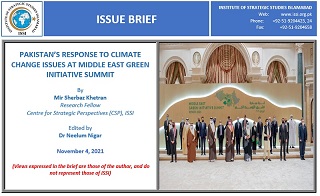Prime Minister Imran Khan attended the Middle East Green Initiative (MGI) Summit, where he shared his perspectives on the challenges faced by the developing countries due to climate change. The Prime Minister highlighted Pakistan’s experience of launching nature-based solutions to address the environmental challenges.[1] The Middle East Green Initiative Summit brought together global and regional leaders to motivate consensus to deliver against shared environmental commitments. Besides Saudi Crown Prince Mohammed bin Salman bin Abdul-Aziz, the MGI Summit was addressed by leaders and representatives of various countries including Kuwait, Algeria, the United Kingdom, Greece, Jordan, Russia, Morocco, Qatar, Iraq and Yemen.[2]
PM Khan, while addressing the MGI summit said that world should take the challenge of climate change more seriously, and he defined measures taken by Pakistan on this front and warned of serious consequences if immediate measures were not taken to address the problem He opined that just 10 per cent of the world’s countries were responsible for emissions causing environmental damage. He also mentioned that Pakistan is among the 10 countries most vulnerable to climate change and over the past 10 years, the country has faced 152 extreme weather events which has triggered an economic loss of over $3.8 billion. Pakistan has already shelved 2,400 megawatts of coal projects and replaced them with 3,700 megawatts of hydroelectricity. And also focused on nature-based initiatives, notably the 10 Billion Tree Tsunami project with 2.5bn trees of the 10bn target already planted.[3] In his speech PM Khan further added that the government plans to plant 1 million more mangroves by 2023, and green parks in the country have been expanded by 50pc during the pandemic. The incumbent government has provided green jobs — jobs that are related to improving the environment and 85,000 jobs have been created in this area and the number is expected to rise to 200,000 by next year. The PM said that the glaciers were melting at a rapid pace due to climate change and as a result, Pakistan and several other countries were at risk of facing water scarcity.[4]
















